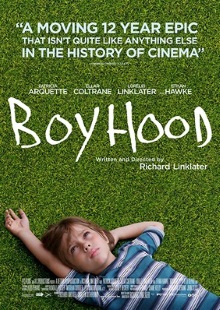
Ever since I heard about this project, I’ve been waiting for it with a great deal of anticipation. Both my wife and myself are huge fans of the Before Sunrise trilogy and filming a story of a boy growing up over a span of twelve years intuitively feels like such a natural extension of that work that Richard Linklater is sure to excel at. The ambition alone of following the same cast, including child actors, across such an extended span of time impressed me greatly.
When we finally sat down to watch it just before the Chinese New Year (which explains why this post is late and the lack of posts on this blog over the past week), it did turn out to be an excellent film and pretty much what I’d expected from Linklater. It has an understated that belies the scope of its ambition. It’s hard to name any single great scene in it, but then it’s hard to do this for any of the Before films either. What makes this so special is how it captures the passage of time so effortlessly. The emotional resonance lies not in any single action or event or even any singular theme but how we perceive the characters to gradually change over time and yet still remain recognizably themselves.
Similarly this is not a film in which to look for great performances. Everyone does a good job, true, and I really appreciated how Ellar Coltrane changes from an adorably cute boy to a goth teen as he grew up. Patricia Arquette undoubtedly deserves her Best Supporting Actress Oscar since hers is the most impressive performance as the mother. But again, it is the interactions of the cast as a whole over an extended period of time that is most impressive.
Yet as good as this film is, the sheer weight of the critical acclaim it has received prompts a kind of skepticism in me. I’m not sure that it’s even the best film overall of last year to me, let alone a landmark film for the ages as some critics seem to suggest. Visually it is thoroughly, even boringly, conventional. The dialogue lacks the snappy wit of the Before trilogy which made them so engaging and entertaining. Many critics have praised the story for its realism but I discern still the shadow of Hollywood drama. For example, the character of the father seems to figure too large in the lives of the children, to the detriment of life in school and friends of similar age. I suspect that Linklater felt that he needed to make the most of Ethan Hawke. The mother’s arc of constantly choosing poor husbands is affecting but also mundane and predictable. Even the sets look so much like what Hollywood thinks white middle-class Americans live like instead of feeling like real, lived-in places.
For all these reasons, I find myself agreeing with those who state that the gimmick of filming across twelve years is more interesting on paper than in practice. This idea does give this film a quality that is unique to it, but it doesn’t necessarily make it actually better. I believe that a better director with a better grasp of the themes that he or she intends to convey could make a better film about growing up just by using the old-fashioned method of using different performers for different time periods. That’s why while Boyhood is to me a very good film, it is still markedly inferior to the director’s previous work and comes far short of being a truly great film.
One thought on “Boyhood (2014)”